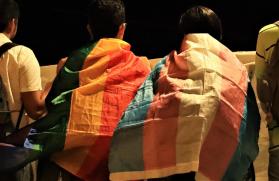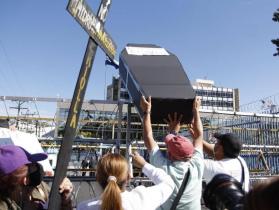Ruling Party Continues Strategy of Criminalization Against Organizations and Universities
Nine months have passed since El Salvador’s Legislative Assembly installed the Special Commission to investigate the destination of funds granted by previous administrations to various non-governmental organizations (NGOs). Ostensibly, the objective of the Commission is to investigate corruption in past administrations, particularly those presided over by the FMLN. However, that pretext seems to have quickly dissolved, as the process has been handled more like a "political show" than as a genuine attempt at transparency or accountability.
The Commission, made up mostly of deputies from the Nuevas Ideas ruling party and its allies, has been responsible for making unsubstantiated accusations by indicating that the investigation is intended to expose the "perverse mechanism" by which the Treasury Commission granted public funds to NGOs. It accuses these NGOS of serving as a "front" to funnel public money to personal or partisan political purposes.
As a result, former FMLN deputies who, before serving as deputies, were members of various social organizations, have been called to appear before the Special Commission. The deputies include Emma Julia Fabián of Mujeres Tecleñas; Lorena Peña, founder of the Mélida Anaya Montes Women's Movement Association (known as Las Mélidas); and Eugenio Chicas and Schafik Handal, founders of the Salvadoran Foundation for Democracy and Social Development (FUNDASPAD).
The interviews with each of these people have been marked by accusations and outbursts. Such was the case in the interrogation of former Legislative Assembly president and FMLN deputy Lorena Peña, which lasted more than five hours. During that time, she was subjected to unfounded accusations, threats of contempt, and verbal violence by Nuevas Ideas deputy Caleb Navarro. According to Peña, the interrogation reached "the point of torture,” in addition to the fact that the deputies were “misogynistic, violent and could be called abusive.”
All of the Commission’s hearings have had a tone similar to that used against former deputy Peña, despite the fact that all of the people called to appear have been able to refute with solid arguments any existence of a "perverse mechanism" for managing public funds to which the investigation alluded.
In February of this year, the Commission called Andreu Oliva, rector of the José Simeón Cañas Central American University (UCA), to question him about funds the UCA received in the amount of $30 million. These funds were used by the university in conjunction with government educational projects over a period of nine years.
All these cases demonstrate a clear attempt on the part of the ruling party to criminalize the work of social organizations, progressive NGOs, or other groups critical of the current administration who have been granted funds to carry out projects in coordination with and under the supervision of various ministries or other government bodies.
In an interview with CISPES, Omar Serrano, Vice Chancellor of Social Projection of the UCA, explained the situation like this: “The objective [of the Commission] is not to clarify or create accountability but rather to discredit these organizations before the people, to make them appear corrupt or that they stole money.” He continues: “The criteria for summoning them is that they are opponents of the government; [the Commission] does not truly seek to investigate what they say they are investigating, rather it is to speak to their base and to destroy the remaining opposition.”
Serrano highlights that the UCA has even been the subject of national presidential broadcasts: “They are looking for all ways to harm the university and we don’t believe that even after this appearance they will give up; on the contrary, they are now even angrier about the reaction of the people, especially on social networks. We have learned of instances where they have wanted to put together a case at a legal level but have not been able to; they tried to use the agreements that the university implemented in previous governments as a Trojan horse for this purpose,” he relates.
Article 131, paragraph 11, of the Salvadoran Constitution establishes that it is the responsibility of the Legislative Assembly to "decree, in a general way, benefits and fiscal incentives of any nature, for the promotion of cultural, scientific, agricultural, industrial, or commercial activities or services.” Similarly, the Organic Law of State Financial Administration, which regulates the fiscal management of the public sector, establishes that any organization that receives subsidies or State grants is subject to those regulations.
The Bukele administration itself in the 2021 General Budget approved the appropriation of $17.1 million in public funds for a large variety of NGOs. Likewise, when previous administrations allocated funds to NGOs, they fully discussed those allocations in the Finance and Special Budget Commission beforehand, and the allocations were approved when the plenary voted on them in the budget for each year. In addition, the funds were delivered by the Ministry of Finance and had to be, by law, audited by the Court of Accounts.
Further, funding requests presented to the Legislative Assembly by nonprofit organizations were made to carry out social projects in areas such as literacy, prevention of violence against women, children's rights, healthcare, environmental protection, among others. Not as payouts to party insiders, as Nuevas Ideas deputies have suggested.
Added to the Commission proceedings has been a series of simultaneous raids, allegedly on the basis of embezzlement, on the NGOs mentioned above in addition to several others including the Salvadoran Association of Humanitarian Aid PRO-VIDA and the Association of Community Projects of El Salvador (PROCOMES). These occurred in November of 2021. However, after these arbitrary inspections, no illegal actions have been found with regard to funding granted to these organizations, all of which have been audited by the Court of Accounts to verify that funds were executed in accordance with their purposes and objectives. On the contrary, the inspections and hearings have only demonstrated the long history of work of these organizations and the importance of that work in populations not served by the State.
It should be noted that the raids took place within the framework of an attempt by the ruling party to approve a “Foreign Agents Law” with the aim of restricting international cooperation, controlling the work of NGOs, and censoring critical media that receives funds from abroad. And while the harassment and persecution against representatives of social and popular organizations continues, the government has promoted reforms to the Law on Access to Public Information, making public administration of funds increasingly less transparent. At the same time, it has created other laws and norms such as the so-called Alabí Law, which deliberately conceals how public funds were managed during the COVID-19 pandemic and obstructs investigation of government officials singled out for possible cases of corruption.
According to Vice-Rector Serrano, "one of the biggest challenges is to repudiate the [government] narrative, which is based on lies," since "no government that dismantles the division of powers, that co-opts public institutions and puts them in the hands of the Executive, and that hides information regarding expenses and the use of resources can have any credibility.”

 "I am a CISPES supporter because continuing to fight for social justice and a more people-centered country means continuing the dream and sacrifice of thousands of my fellow Salvadorans who died for that vision.” - Padre Carlos, New York City
"I am a CISPES supporter because continuing to fight for social justice and a more people-centered country means continuing the dream and sacrifice of thousands of my fellow Salvadorans who died for that vision.” - Padre Carlos, New York City

